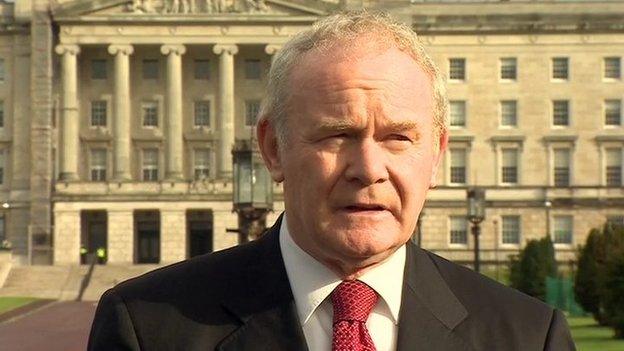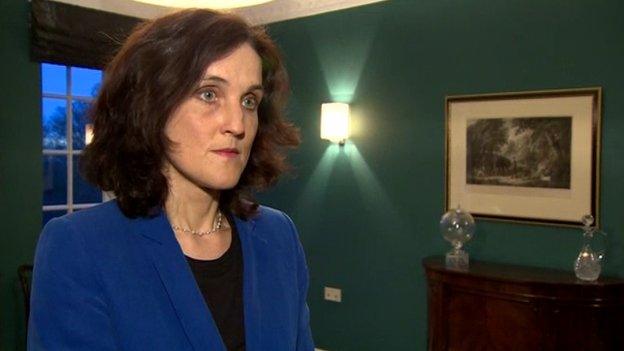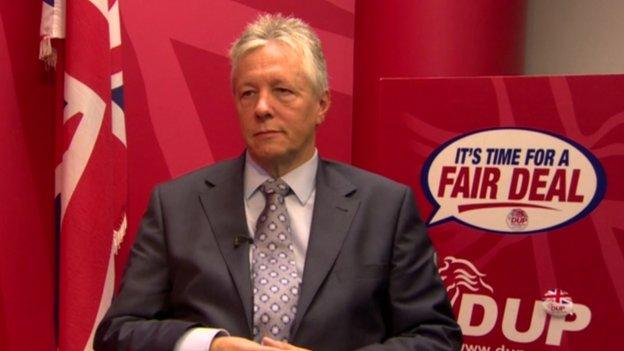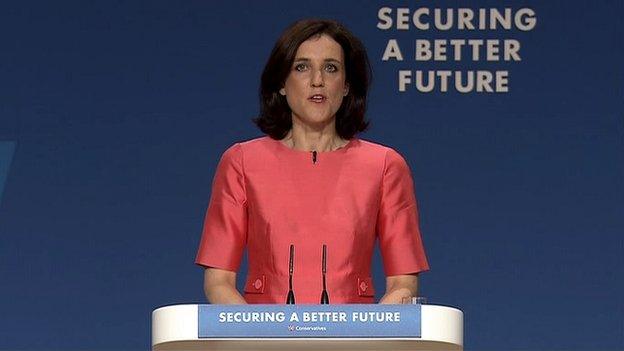Martin McGuinness: Last two years of office 'appalling'
- Published

Mr McGuinness was speaking to the media before heading into the political talks
Northern Ireland's deputy first minister Martin McGuinness has said the last two years of his term in office have been "absolutely appalling".
The Sinn Féin minister blamed the Democratic Unionist Party and other unionists for their "unwillingness" to accept "democratic decisions".
Mr McGuinness was speaking ahead of talks aimed at resolving difficulties among the five parties at Stormont.
Northern Ireland Secretary Theresa Villiers is chairing the first session.
The Democratic Unionist Party (DUP) has said it will not attend the first round-table session, with its party leader, Northern Ireland First Minister Peter Robinson, describing it as a "circus" arranged for the cameras.
Mr McGuinness told a press conference at Stormont that the DUP had shown "contempt" for the process.
He said the last two years had been appalling "because of the unwillingness, refusal of the DUP and other unionists" to accept "democratic decisons".
He cited decisions "taken by by Belfast City Council, parading decision taken by the Parades Commission, pulling the plug on on-the-record commitments - things like the development of the Long Kesh site - and of course, the latest example, which I think is symbolic of the inability of the DUP to accept equality, the dishonouring of a commitment made by Ian Paisley and Peter Robinson with regards to the installation of a Sinn Féin speaker for rest of this term of the assembly".
However, he said the British government was "as much a part of the problem".
"We will not be found wanting, I hope others will not be found wanting," he said.
SDLP leader Alasdair McDonnell told the media there were "more questions than answers" at this point.
"People are expecting progress, prosperity, legacy to flow from the assembly and from Stormont. That hasn't been delivered yet," he said.
"It is our contention that the failure is the failure of the two main parties rather than the system. We believe that things can be put together. Where there's a will there's a way."
"We feel a little bit angry that some people are playing party political politics, and playing for electoral advantage."
Earlier, Prime Minister David Cameron said the political talks must "lift the blockages" preventing its power-sharing executive from delivering effective government.
Mr Cameron said he and Irish Prime Minister Enda Kenny were expecting a progress report by the end of November.
The secretary of state, Theresa Villiers, said she was approaching the talks with optimism, but added it was vital for the devolved administration that progress was made.

Northern Ireland Secretary Theresa Villiers convened the government-led talks
DUP Chief Whip Peter Weir said the party would meet Ms Villiers on Thursday to discuss budget and welfare issues, but "will not be engaging with the Irish government about matters that are exclusively internal Northern Ireland affairs".
The talks were originally planned for Stormont's Parliament Buildings, home of the Northern Ireland Assembly.
However, some unionists raised objections to the Irish government having a presence at the assembly.
So the opening session has been switched to Stormont House - the Northern Ireland Office's Belfast base.
Like the Haass talks, which ended without a deal last December, the negotiators will consider the problems of flags, parades and the legacy of the Troubles.
In addition, they will examine the Stormont budget crisis and changes to the way the assembly and executive work.
- Published10 October 2014

- Published28 September 2014

- Published9 September 2014
